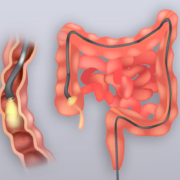Protect Your Colon Health: Do a Test
Continuing with our examination of the study on invited colonoscopies versus usual care, what could the researchers have said to cause any controversy? Remember, the comparative rates of diagnosing colorectal cancer were slightly lower in the invited group. The controversy came when they stated that there was no difference in mortality over the course of 10 years. That suggests that it doesn’t matter whether you’re specifically asked to have a colonoscopy or get one as part of your usual care—your risk of dying from colorectal cancer, the second leading cause of cancer deaths in the U.S., is no different. As you might expect, nothing is quite as simple as it appears to be.
Invitations Don’t Mean You’ll Accept
The stunning part to me was that only 42% of the people in the invitation group accepted and had the colonoscopy. This is where going back to ask why the subjects did or did not have the colonoscopy is important. The people were not identified by name but by a randomly generated number. In order for the data to be meaningful, we need to know why the potential subjects chose not to participate.
What About Other Diagnostic Tests?
The most common test at this point is the fecal occult blood test (FOBT). This test looks at a sample of your stool to check for blood; the key is that it’s blood that’s not visible to the eye (that’s what occult means in this case). Blood in the stool can be a symptom of several conditions including anemia and colorectal cancer; the test can also be used to identify genetic risk factors for colorectal cancer.
What the test can’t do is identify those people who have adenomas, a precancerous growth. Not all adenomas become cancerous, but they can be removed during a colonoscopy and tested for cancer. The fecal occult blood test can’t detect adenomas that are not bleeding.
The Bottom Line
The thing to remember is that testing is important, whichever way you do it. Colonoscopies require the marvelous “colon cleansing preparation” that may be too hard on elderly people or those with poor health; it’s no walk in the park for anyone. The cost may also be prohibitive depending on the type of insurance coverage one has. Protecting your colon health calls for a serious discussion with your healthcare provider to find out what the best course of action is for you. Family and personal history both have a role to play and need to be considered.
The purpose of research such as this is to help you find what your path should be. But once you know it, follow it. Ignoring it may bring undesired outcomes—and the last time I checked, death is permanent.
What are you prepared to do today?
Dr. Chet
Reference: New England Journal of Medicine. 2022. DOI: 10.1056/NEJMoa2208375









